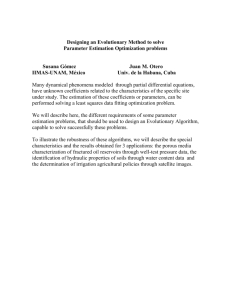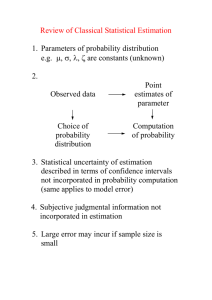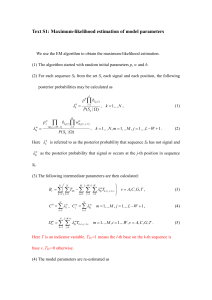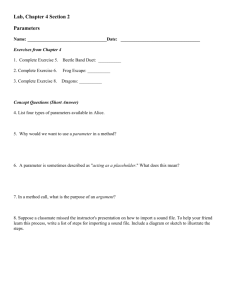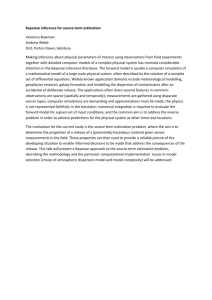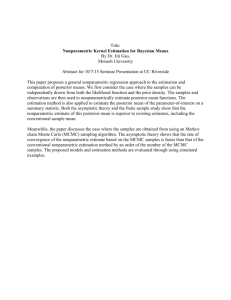PARAMETER OBSERVATIONS OF GAMMA MODEL ESTIMATION OF
advertisement
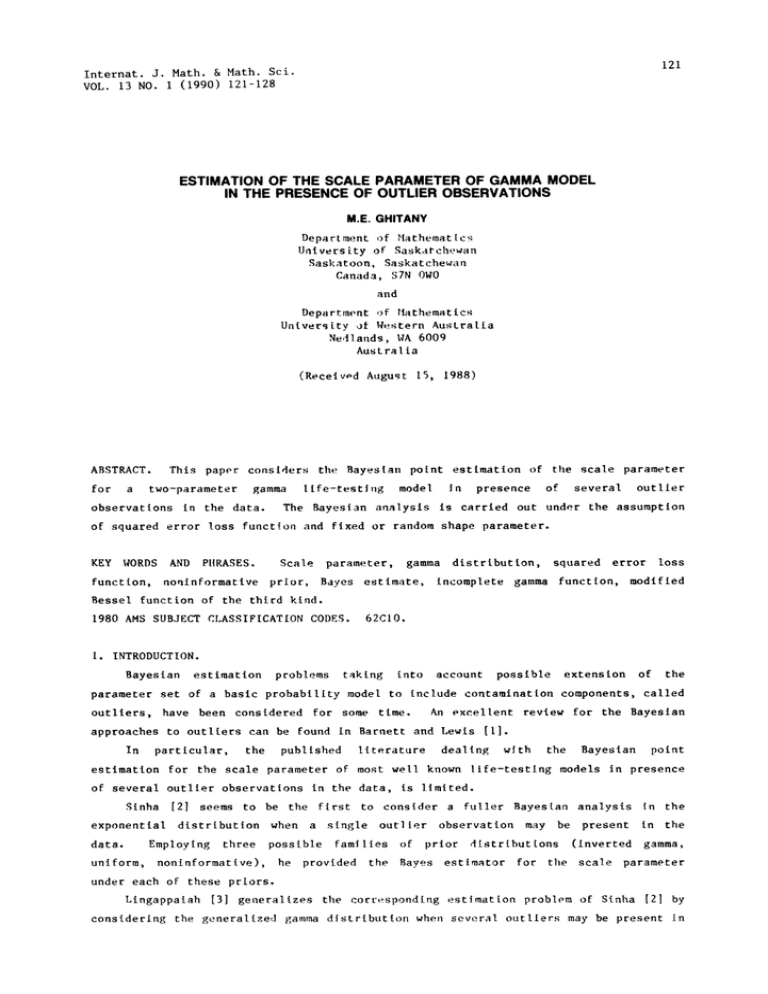
121
Internat. J. Math. & Math. Sci.
(1990) 121-128
VOL. 13 NO.
ESTIMATION OF THE SCALE PARAMETER OF GAMMA MODEL
IN THE PRESENCE OF OUTLIER OBSERVATIONS
M.E. GHITANY
Department of Mathemat
University oF Saskatchewan
Saskatoon, Saskatchewan
Canada, S7N OWO
and
Department
,)f lathematics
UniversEty of Western Australia
Nedlands, WA 6009
Australia
(Received August 15, 1988)
This paper considers the Bayesian point estimation of the scale parameter
ABSTRACT.
for
a
two-parameter
gamma
life-testl,g
model
In
presence
several
of
outller
The Bayesian analysis is carried out under the assumption
observations in the data.
of squared error loss function and fixed or random shape parameter.
AND
KEY WORDS
PIIRASES.
noninformatlve
function,
Scale
prior,
squared
gamma distrlbutton,
parameter,
loss
error
incomplete gamma function, modified
Bayes estimate,
Bessel function of the third kind.
1980 AMS SUBJECT CLASSIFICATION CODES.
62CI0.
I. INTRODUCTION.
Bayesian
problems
estimation
taking
account
into
extension
possible
of
the
parameter set of a basic probability model to include contamination components, called
An excellent review for the Bayesian
outllers, have been considered for some time.
approaches to outliers can be found in Barnett and Lewls [I].
In
particular,
the
published
dealing
literature
wth
the
Bayesian
point
estimation for the scale parameter of most well known life-testlng models in presence
of several outlier observations in the data, is limited.
Sinha
exponential
[2] seems to be the first to consider a fuller Bayesian analysis in the
distribution
Employing
data.
uniform,
three
when a single
possible
noninformative),
he
outlier
families
provided
the
of
observation
prior
may
be
distributions
present
in
the
(Inverted gamma,
Bayes estimator for the scale parameter
under each of these priors.
Lingappaiah [3] generalizes the corresponding estimation problem of Snha [2] by
considering the generalized gama
d|strlbutlon
when several outllers may be present
n
M.E. GHITANY
122
the data.
Accordingly, he derived the Bayes estimator of the scale parameter for each
However, assuming
of the exponential, gamma and Weibull distributions.
fixed shape
parameter, he only employed one particular member of the inverted gamma prior family
for the scale parameter.
It should be mentioned here that in both of the above two papers, the authors
employed beta prior family to each parameter causing the contamination in the data.
Only, Sinha [2], briefly discussed the robustness of the posterior distribution of the
scale parameter when the parameter causing the contamination is fixed.
Also, Lingappaiah [4] studies the effect of a single outlier observation on the
Bayesian estimation of the parameters of normal llfe-testlng distribution model.
In this paper, we consider the following point estimation problem. Suppose an
x
k observations are from the gamma
in such that n
,x 2
n)
observed sample (x
family with p.d.f
exp[-x/o] x -I
f(x; o)
>
x
O,
a,
> O,
(I.I)
r()a
is the shape parameter, while k observations are from different families with
where
...,
<
k. Assume that the parameters ’s
4 I, r
I, 2
r
are fixed and the set of k outllers is likely to be any set of k observations from the
p.d.f’s
f(x;O/r),
sample.
Under squared error loss function, the main problem here is to find a closed
form expression
parameter
0
Bayes estimator of the scale parameter
for the
is either a fixed real number or a random variable,
fixed shape parameter
when the
shape
respectively.
For
the following prior families of distributions are considered:
(i) Inverted Gamma family
b
g(o)
o-(b+l)
a
r() exp[-a/o]
o
>
0,
a,b
>
0,
(1.2)
(This is a natural conjugate prior for o (Raiffa [5]));
(ll) Uniform family
g(o)
a2
(lii) Exponential family
-1
g(o)
al,
a
I<
o
<
(1.3)
a 2,
> o;
> O,
exp[-o/],
(1.4)
(iv) Noninformatlve family
g(o)
-c
a
a> O,
For random shape parameter
c
> o.
(1.5)
we consider a mixture of discrete prior and a
conditional inverted gamma prior distribution on
Pr{=j} pj,
J
1,2
.....
and o, respectively, as follows:
m,
]j > O,
(1.6)
123
ESTIMATION OF THE SCALE PARAMETER OF GAMMA MODEL
-(+I) " >
r() exPl-j/I
g(ol=Uj
0
Uj
5 >
(I 6a)
0
(This is a natural conjugate prior for (, (Ralffa [5])).
Note that all the above priors were considered, partlally or totally, in the work
of Sinha [2], Lingappalah [3,4], Bhattacharya [6], Canavos and Tsokos [7], and Lwln
and Slngh [8].
In the subsequent sections we will derive the posterior mean, i.e. the Bayes
and
estimator,
the
of
variance
scale parameter o under each of
the above priors,
respectively
2. ESTIMATION OF o WHEN
IS FIXED
To work out the Bayes estimator of
,
note that the llkellhood function can be
expressed as
f(xl r
f(xj;o)
k
n
" j+In
L(o)
f(xj;o)
i
r- In
where the summation denotes the k-fold sums over the components of the vector i
(il,
i
i
2
k)
such
that
i
*
i
2
*
i
k
n.
This
likelihood
function
must satisfy the following relation:
L(o) o(
[
exp[-w i (_q)/O]
i
where
_a-=(5’ 2
and
k
k
n
wl (-=)
(2.1)
0
[ (1-r)Xl
r
(2.2)
r=l
where x is the sample mean.
Now, the likelihood function and the prior density of o are used to obtain the
That is, according to Bayes’ theorem the posterior density of
is
posterior density.
given by
(o)
where
L(o) g(o)
g(o) do
(2 3)
’’]f L(o)
is the parameter space containing o
Consequently, we can find the posterior
mean and variance for o.
Respectively considering the priors (1.2), (1.3), (1.4) and (1.5), the posterior
are as follows:
densities of
W( o)
A
(n, _,a,b) r. exp[-{a + w i(_)}/o]
-(n u+b+
o
(2.4)
i
where
A(n,__a,a,b)
F(n, + b) r [a + w I
i
(_a)]-(n+b);
(2.4a)
124
M.E. GHITANY
where
B(n, a l,a2)
E
[wi(_a)]
-(nu-1)
n > I,
y*(nu-l,wi(_a)),
(2.5a)
for which
and
T(’r,z/a2),
(’r,z/a 1)
y* (’r,z)
(2.5b)
(.,.) denotes the well-known incomplete gamma function (Andrews [9]);
(ill)
c-l(nu,_._a,X)
v(o)
Z exp[-{o/X +
-nu,
wi(.._a)/o}]
i
o
(2.6)
where
-(n-l)/2
C(n,a,)
Z
i
[Wl(=)]-(nu-l)/2 Kn-I
2[wi(a)/] I/2)
(2.6a)
and K (.) is the modified Bessel function of the third kind of order x (Andrews [9]);
(iv)
D-I(nu,.._,c)
(o)
E
i
where
r(nu + c-l) r.
D(n,_a,c)
i
/o] o-(n.+c)
exp[-wi()
[w(._a)] -(nU+c-1),
(2.7)
(2.7a)
n+c>l.
From the above posterior densities, the posterior means of o, also respectively,
are
a+wl
o
(_a) n+b-I
E Ai
i
where
A * (_a)
I
A
B
o*
C
o
[.
-I
o*
-I
(n,_a,a,b) r(nu+b)[a +
(n,9,a
,a
(2.8)
n+b>l,
2)
B(n-l,,a
wl(_a)]-(n+b)
,a2),
nu>l,
(2.8a)
(2.9)
(ill)
-I
(nu,_._a, l) C(nu-1,_._a,
(iv)
w
i
where
D
i
D
I
(a)
(2.10)
i (__a)
-I
(__e)= D (nv,_q,c)
(2.11)
nu+c>2
n+c-2
r(nu+c-l)[wi(__a)]
-( n +c-
(2.11a)
and the posterior variances of o are:
(i)
Var(o)
E Ai
i
(ll)
Var()
*2
[a+wl (_a)
(_a)
2
(n +b-I 2 (n +b-2)
B(nu,_a,a l,a 2) B(n-2,_a,a l,a 2)
B2 (nu,_, a
,a 2
n+b>2,
B2(n-l,_a, al,a 2)
(2.12)
(2.13)
125
ESTIMATION OF THE SCALE PARAMETER OF GAMMA MODEL
provided
nu
>
2;
C(n,_a, ) C(n-2.__a, )
Var(o)
C
2(n
1,_a, )
(2.14)
2
c (n,,_a, )
(iv)
w
Vat(o)
Z D t(a)
given by
and o are
random variables
u-I
n(,o) (
of
>
3.
(2.15)
having the mixture prior distributions
(1.6) and (l.6a), the likelihood function in this case must satisfy the
following relation:
where u
nB- c
IS A RANDOM VARIABLE
ESTIMATION OF o WHEN
When both
i (_=)
(nB+c-2) 2 (n+c-3)
i
3.
2
i=l
Z
rn(,)
i
-
o-n’
exp[-wi(a)/o]
(3.1)
This implies that the marginal posterior probability distribution
xi
is given by
*
Pj (_)
Pj (_)
J --1,2
__lps, (_)
(3.2)
,m.
where
Also, the conditional posterior density of o given
is given by
Uffij
h(o[fJ)ffiQ-l(a’j’vJ)- iZ exp[-{wi_(a)+B.}/o]3
-(nj+vj+1)
(3.4)
where
Q(_a,.j,uj)
r(nj+j)
i [w_i(__a) Ij]-(nlj+J ).
+
(3.4a)
Now, the product of (3.2) and (3.4) yields the Joint posterior distribution of
and q.
The (unconditional) posterior mean of
o
r.
r.
i j=l
wi(a)
Q_i,J (a) nuj+ vj-I
is of the form
n,j+ vj>
I,
(3 5)
where
*
pj (_a)
Q*!,J(-a)
provided
nuj
+j>l
Q
for all j
-I
uj]-(nuj+vJ)
r(nuj
1,2
m; and the posterior variance is
m
Vat(o)
+
(__a, uj,vj)
E
E Q
i__ J=l
*2
vj) [wi_(_a)
[w (-q) +
I
(nuj+
+
(3.5a)
2
vj-l)2(nj+j-2)
(3.6)
M.E. GHITANY
126
provided
4.
for all j=l,2,
nj+>2
m.
IS FIXED
HOMOGENEOUS CASE WHEN
In the case of simple random sample from a complete life test, the posterior
mean, and variance of o can be derived from those in section 2 by letting
=I, for
1,2, ...,k.
all r
Respectively considering the priors (1.2),
(1.3), (1.4) and (1.5), the
posterior
means of o, in the homogeneous case, are:
(i)
*
(+ nx
o
> I,
nu + b
nu + b-l’
(4.1)
where x is the sample mean;
(ii)
--’(n- 2, nx)
n,
>
2
(4 2)
mx] I/2
(4.3)
n
y*(n- 1, nx)
(iii)
, Kn_2(
Kn_l(
o
(iv)
*
/All/Z)
2[n /]I/2)
2[n
nx
0
nD+
c
>
(4.4)
2,
nB+c- 2
and the posterior variances are:
(i)
n)2
(a +
Var(o)
(nu + b
1)
2
(ll)
Y(nl-l, n) (nj73n
Var(o)
nu +
(nu + b
f2(nl-
b
>
(4.5)
2,
2)
-y2(n,l-2,n,) (n)2
1, n)
n > 3,
(4.6)
(ill)
Vat(o)
ZnB_
(2 [n/X]
(iv)
Var(o)
Kn-2(2[nx/]I/2)
I/2) Kn-3 ([nx/l] I/2
2
I/2
K nB_2(2 [nx/]
(n)2
n+c >
(nl + c-2) 2 (nl + c-3)
The above results agree with Bhattacharya
[6], Canavos
knx,
(4.7)
(4.8)
3.
and Tsokos
[7], and
Lwln
(l.6a),
the
and Singh [8].
5.
-
HOMOGENEOUS CASE WHEN B IS A RANDOM VARIABLE
When B and o have the mixture distribution
given
by
(1.6)
and
posterior mean of o in this case is
,
o
m
Z
Jffil
p
2
nx
nj+
+
j
I’
nj +
>
(5 I)
127
ESTIMATION OF THE SCALE PARAMETER OF GAMMA MODEL
where
*
--P-J-
1,2
s=l
Ps
with
p]
pj
u
(5. Ia)
m
r(nj_ + _j
j-
rn(j)
(nx +
(5. Ib)
nj
and the posterior variance of o takes the form
m
Vat(O)
I
j=l
P
2
(nx + I,)
*2
2
(n,j+ j-l) (n,j+j-2)
These results agree with Lwtn and Stngh
ACKNOWLEDGEMENT.
1 would
llke
to
[8], and Martz
nj+ j >
2.
(5.2)
and Waller [I0].
express my thanks to L. Ringuette and the
referee for their valuable comments and suggestions for improving the presentation of
this paper.
REFERENCES
I.
2.
3.
4.
5.
6.
7.
8.
9.
Outllers in Statistical Dgt_a Second Edition, John
BARNETT, V. and LEWIS, T.,
Wiley & Sons, 1978.
SINHA, S.K., Life Testing and Rellabillty Estimation for Non-Ilomogeneous Data
a Bayesian Approach, Comm. Statist. A-Theory Methods 2(3) (1973) 235-243.
LINGAPPAIAH, G.S., Effect of Outllers of the Estimation of Parameters, Metrlka
23(1976) 27-30.
LINGAPPAIAH, G.S., Problem of Estimation when the Outllers are Present,
TrabaJos. Estadit. ny@stgaclo_n 0per. 30(3)(1979) 71-80.
RAIFFA, H., Decision Analysis, MA:Addison-Wesley, 1968.
BHATTACHARYA, S.K., Bayesian Approach to Life Testing and Reliability
Estimation, J. Amer. Statist. Assoc. 26(1976) 48-62.
CANAVOS, G.C. and TSOKOS, C.P., A Study of an Ordinary and Empirical Bayes
Approach to Reliability Estimation in the Gamma Life Testing Model,
Proceedings 1971 Annual Reliability and Malntalnabil.ty Symposium, (1971),
343-349.
LWIN, T. and SINGH, N., Bayesian Analysts of the Gamma Model in Reliability
Estimation, IEEE Trans. Rellability R-23(5), (1974), 314-319.
ANDREWS, L.C., S_pec[al Functions for Engineers and Ap_pplled Mathematicians,
Macmillan Publishing Company, 1985.
I0. MARTZ, H.F. and WALLER, R.A., Bayesian Rellab[llty Analysis, John Wiley & Sons,
1982.
